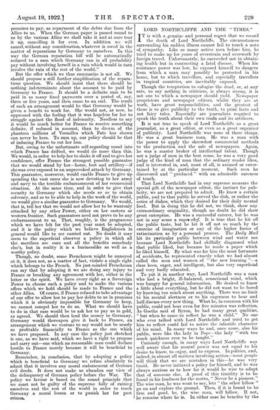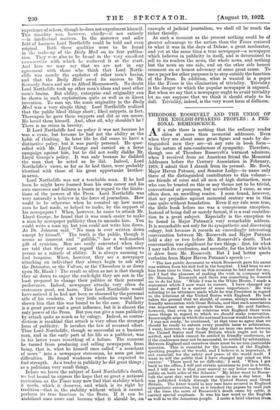LORD NORTHCLIFFE AND THE " TIMES."
T is with a genuine and personal regret that we record 11 the death of Lord Northcliffe. The circumstances surrounding his sudden illness cannot fail to touch a note of sympathy. Like so many active men before him, he tried to make up for years of overstrain and overwork by foreign travel. Unfortunately, he succeeded not in obtain- ing health but in contracting a fatal disease. When his resistance power was low, he exposed himself to dangers from which a man may possibly be protected in his home, but to which travellers, and especially travellers in tropical countries, are inevitably exposed.
Though the temptation to eulogize the dead, or, at any rate, to say nothing in criticism, is always strong, it is not one to which a newspaper should yield. Newspaper proprietors and newspaper editors, whilst they are at work, have great responsibilities, and the greatest of these is to give publicity to the truth, to print facts and not fairy tales. Especially are journalists required to speak the truth about their own trade and its artificers.
It is not true to speak of Lord Northcliffe as a great journalist, as a great editor, or even as a great organizer of publicity. Lord Northcliffe was none of these things. He was a great business man. He was a man with the power to apply the shrewdest commercial methods to the production and the sale of newspapers. Again, he was a master broker of intellectual talent. Though not a judge of men in the best sense, he was a very good judge of the kind of man that the ordinary reader likes, and is interested in, and, most of all, is amused or enter- tained by at the particular moment. Such men he discovered and " produced " with an admirable sureness of touch.
That Lord Northcliffe had in any supreme measure the special gift of the newspaper editor, the instinct for pub- licity, we arc not prepared to admit. He knew a certain public, and to that public he served the dish, or rather the series of dishes, which they desired for their daily mental food. But in doing this he did not, we think, show any extraordinary originality, though no doubt he did show great enterprise. He was a successful caterer, but he was not in any sense a super-chef. It is true that he hit off the public taste, but he hit it off not so much by the exercise of imagination or any of the higher forms of ratiocination as by a personal process. The Daily Mail hit its particular public between wind and water not because Lord Northcliffe had skilfully diagnosed what that public liked, but because he made a paper which he liked himself. By what was for him the most fortunate of accidents, he represented exactly what we had almost called the men and women of " the new learning "—a class keen, eager, and intelligent, but also very superficial and very badly educated. To put it in another way, Lord Northcliffe was a man who had a bright, ill-balanced, sensational mind, which was hungry for general information. He desired to know a little about everything, but he did not want to be bored by knowing too much about anything. There was no limit to his mental alertness or to his eagerness to hear and half discuss every new thing. What he, in common with his public, could not bear even for five minutes was reflection. As Goethe said of Byron, he had many great qualities, " but when he came to reflect he was a child." No one who ever talked with Lord Northcliffe and tried to get him to reflect could fail to notice the infantile character of his mind. In many ways he and, once more, also his public, were like the lady in Pope—the lady " with too much quickness ever to be taught." Curiously enough, in many ways Lord Northcliffe was well aware that his mental power was not equal to his desire to know, to enjoy, and to express. In politics, and, indeed, in almost all matters involving action—most people will think that we are mistaken in this—he was very timid. He never initiated a policy for himself, and he was always anxious as to how far it would be wise to adopt that of someone else. A proof of this timidity is to be found in his fondness for the motto, " Never be a pioneer." The wise man, he was wont to say, lets " the other fellow " go on and explore the ground. Then, if it is found to be firm and good, he, the wise man, will follow. If not, he remains where he is. In either case he benefits by the experience of others, though he does not experiment himself. This timidity was, however, chiefly—if not entirely —in intellectual matters. In the narrower and safer field of business Lord Northcliffe could be bold and even original. Both these qualities were to be found in the make-up of the Daily Mail on its first publica- tion. They were also to be found in the very excellent news-service with which he endowed it at the start. And here we may say that we are not in any agreement with those who think that Lord North- cliffe was merely the exploiter of other men's brains, and that the Daily Mail owed its success to Mr. Kennedy Jones and not to Alfred Harmsworth. No doubt Lord Northcliffe took up other men's ideas and used other men's brains. But ability, enterprise and originality can be shown in such exploitation quite as well as in direct invention. To sum up, the main originality in the Daily Mail was a very simple thing. Lord Northcliffe realized that the public liked things short ; liked snippets, in fact. Thereupon he gave them snippets and did so con amore. He loved them himself. And, after all, why shouldn't he ? There is no crime in brevity. If Lord Northcliffe had no policy it was not because he was a cynic, but because he had not the ability or the habit of thinking. In later life he did come to have a distinctive policy, but it was purely personal. He quar- relled with Mr. Lloyd George and carried on a fierce campaign against him, but he did not really dislike Mr. Lloyd George's policy. It was only because he disliked the man that he acted as he did. Indeed, Lord Northcliffe's views, so far as he had them, were probably identical with those of his great opportunist brother- in-arms.
Lord Northcliffe was not a teachable man. If he had been he might have learned from his own career and his own successes and failures a lesson in regard to the limita- tions of the powers of the Press. Lord Northcliffe was very naturally a believer in the force of journalism. How could he be otherwise when he counted up how many men he had made, or helped to make, by the support of his newspapers ? When, however, he came to attack Mr. Lloyd George, he found that it was much .easier to make a man by newspaper publicity than to unmake him. You could write a man up, but you could not write him down. As Dr. Johnson said, " No man is ever written down except by himself." The truth is the public, though it seems so innocent and " gullible," has a well-marked gift of cynicism. Men are easily converted when they are told that they must regard this or that unknown person as a miracle of ability. It is always amusing to find bargains. When, however, they see a newspaper attacking an individual they always begin to ask why the Detonator, or the Vulture, or the Chameleon is so down upon Mr. Blank ? The result as often as not is that though they sit down to enjoy the cock-fight they are not in the least prepared to change their politics or their personal preferences. Indeed, newspaper attacks very often do statesmen good, not harm. This Lord Northcliffe would have noticed if he had not been so obsessed by the personal side of his vendetta. A very little reflection would have shown him that this was bound to be the case. Publicity is a great power and a great influence, but it is almost the only power of the Press. But you can give a man publicity by attack quite as much as by eulogy. Indeed, so contra- dictions is mankind that attack is very often the stronger form of publicity. It invokes the law of reversed effort. Thus Lord Northcliffe, though so successful as a business man, and in the early part of his life as a publicist, was in his latter years something of a failure. The moment he turned from producing and selling newspapers, from being, that is, what he himself once called " a merchant of news " into a newspaper statesman, he soon got into difficulties. He found weakness where he expected to find strength. As a trader in publicity he did great things ; as a politician very small things.
Before we leave the subject of Lord Northcliffe's death, we feel bound to express the hope that so great a national institution as the Times may now find that stability which it needs, which it deserves, and which is its right by tradition—that is, the stability without which it cannot perform its true function in the State. If it can be stabilized once more and become what it should be. an example of judicial journalism, we shall all be much the richer thereby.
At such a moment as the present nothing could be of greater advantage to the nation than the Times restored to what it was in the days of Delane, a great moderator, and yet at the same time a true newspaper—a newspaper which believes in publicity in itself, and is determined to sell to its readers the news, the whole news, and nothing but the news on one side, and on the other side honest comment on or honest advocacy of some great cause. To use a paper for other purposes is to step outside the function of the Press. In addition, what is wanted in a paper like the Times is the elimination of triviality. Triviality is the danger to which the popular newspaper is exposed. But when we say that a newspaper ought to avoid triviality let no one suppose that we think it should study to be dull. Triviality, indeed, is the very worst form of dullness.



































 Previous page
Previous page